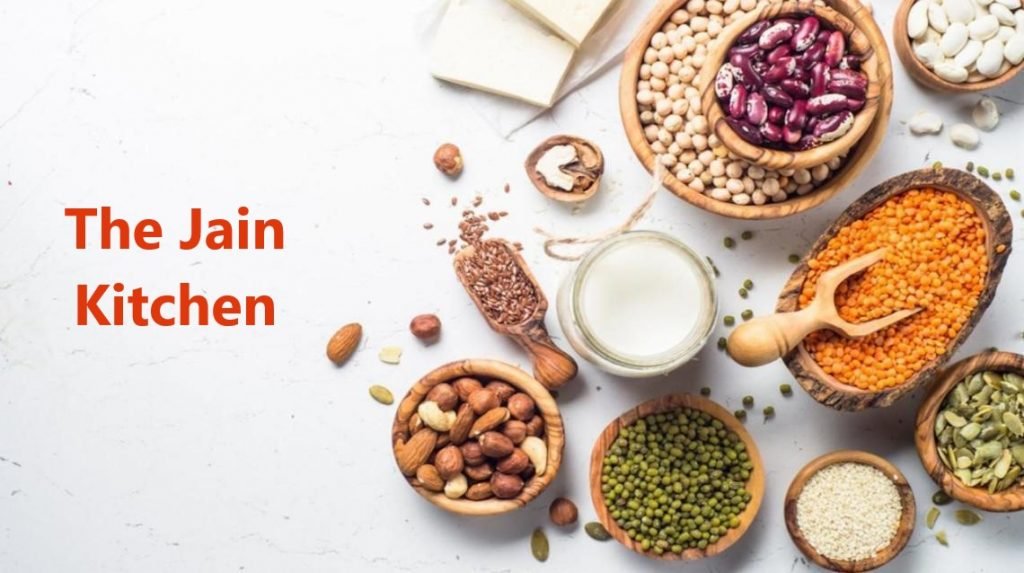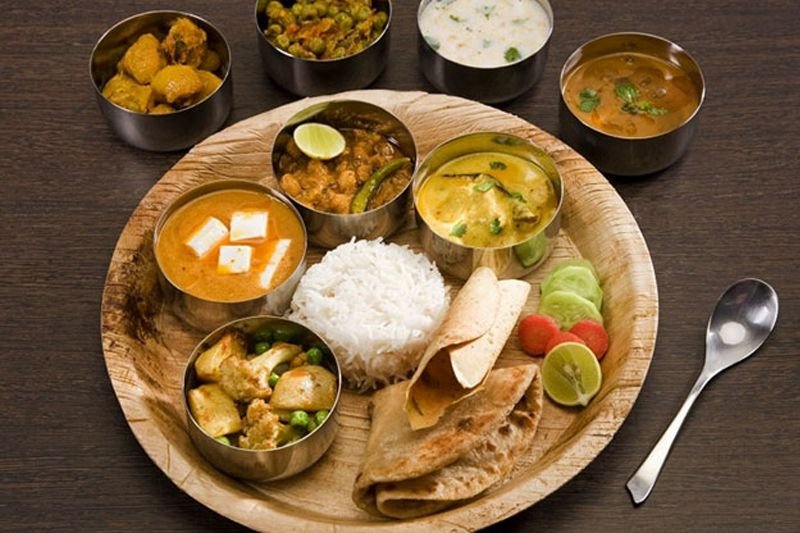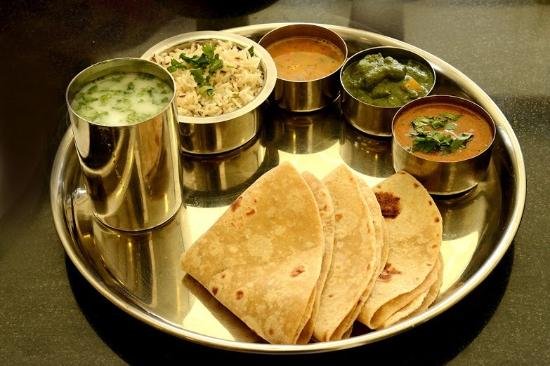
Jainism, an ancient Indian religion, has significantly influenced Indian cuisine. The Jain dietary principles of vegetarianism and non-violence, known as Ahimsa, have shaped a unique culinary tradition.
Jain Dietary Principles and Their Influence
Ahimsa: The Principle of Non-violence
Ahimsa and Jainism
Ahimsa, which translates to non-violence, is a fundamental principle of Jainism. It is a doctrine of compassion towards all living beings, and it extends beyond physical violence to include violent thoughts and words.
Ahimsa in Dietary Practices
In the context of dietary practices, Ahimsa has led to the adoption of vegetarianism among Jains. It prohibits the consumption of any form of meat, fish, and eggs, as these involve harm to living creatures.
Ahimsa and Root Vegetables
Ahimsa in Jain dietary practices also extends to the exclusion of root vegetables like onions, potatoes, and garlic. The belief is that the extraction of these plants involves unnecessary harm to the organisms in the soil.
The Impact of Ahimsa on Indian Cuisine
The principle of Ahimsa has significantly influenced Indian cuisine, particularly in regions with a significant Jain population. It has led to the creation of a variety of flavorful and nutritious vegetarian dishes that adhere to the principle of non-violence.
Tags: Ahimsa, Jainism, Dietary Practices, Vegetarianism, Indian Cuisine, Non-violence, Root Vegetables
Aparigraha: The Principle of Non-possession
Aparigraha and Jainism
Aparigraha, translating to non-possession or non-attachment, is a fundamental tenet of Jainism. It encourages individuals to limit their worldly possessions and avoid excessive consumption.
Aparigraha in Dietary Practices
In terms of dietary practices, Aparigraha promotes the consumption of only what is necessary. This principle has fostered a minimalistic approach to food in Jainism, focusing on simplicity and nutrition.
Aparigraha and Fasting
Aparigraha also manifests in the practice of fasting among Jains. Fasting is seen as a way to practice self-restraint and limit consumption, aligning with the principle of non-possession.
The Impact of Aparigraha on Indian Cuisine
The principle of Aparigraha has had a significant influence on Indian cuisine. It has led to the development of simple, nutritious dishes that adhere to the Jain philosophy of minimalism and non-excess.
Tags: Aparigraha, Jainism, Dietary Practices, Minimalism, Indian Cuisine, Non-possession, Fasting
Jain Cuisine: A Blend of Taste and Tradition
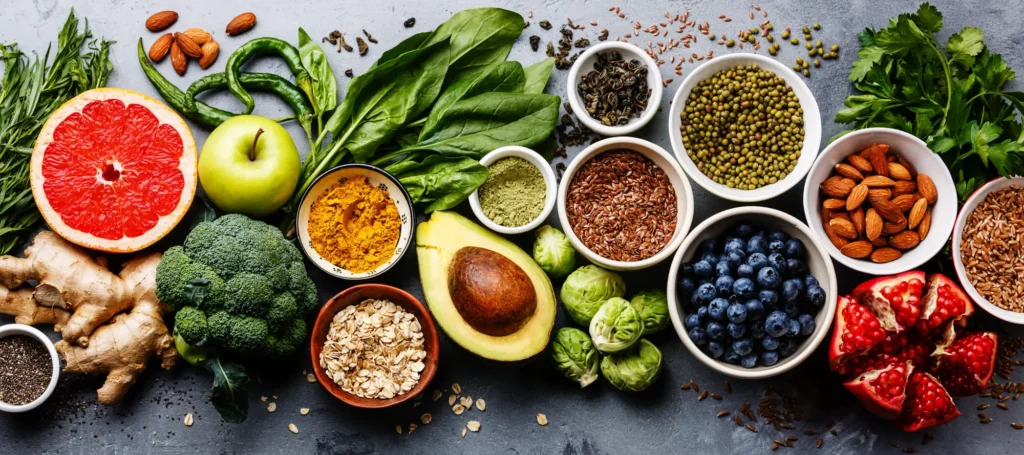
Sattvik Food: Purity in Cuisine
Sattvik Food and Jainism
‘Sattvik’ food in Jainism embodies the qualities of purity and goodness. It is synonymous with food that is prepared with minimal harm to living beings and is considered pure, clean, and wholesome.
Ingredients in Sattvik Food
Sattvik food primarily includes fresh fruits, vegetables, grains, and dairy products. It excludes meat, fish, eggs, and also certain plant-based foods like onions, garlic, and root vegetables that are believed to stimulate negative emotions.
Sattvik Food and Health
Sattvik food is not only about spiritual purity but also about physical well-being. The focus on fresh, minimally processed ingredients makes it a healthy choice, aligning with the modern trend towards clean eating.
The Impact of Sattvik Food on Indian Cuisine
The concept of Sattvik food has significantly influenced Indian cuisine, particularly in regions with a strong Jain presence. It has led to the creation of a variety of dishes that are flavorful, nutritious, and align with the Jain principles of non-violence and purity.
Tags: Sattvik Food, Jainism, Indian Cuisine, Purity, Vegetarianism, Clean Eating
Fasting and Festivals: A Culinary Celebration
Fasting in Jainism
Fasting is a significant aspect of Jainism, viewed as a spiritual practice to purify the soul. It’s a demonstration of self-control and commitment to the principles of non-possession and non-attachment.
Fasting and Food
During fasting periods, Jains consume limited quantities of food and drink, often opting for simple, easily digestible meals. This practice has led to the creation of specific recipes that are light yet nutritious.
Jain Festivals and Cuisine
Jain festivals, such as Paryushan and Mahavir Jayanti, are occasions for culinary celebration. These festivals witness the preparation of unique dishes that adhere to strict dietary rules, offering a feast of flavors.
The Impact of Fasting and Festivals on Indian Cuisine
Fasting and festivals in Jainism have significantly influenced Indian cuisine. They have led to the development of a variety of dishes that are not only adherent to Jain dietary rules but also offer a unique gastronomic experience.
Tags: Fasting, Jain Festivals, Jainism, Indian Cuisine, Paryushan, Mahavir Jayanti, Culinary Celebration
Jainism and Veganism
Jainism: A Precursor to Veganism
Jainism, with its emphasis on non-violence and respect for all forms of life, can be seen as a precursor to veganism. The Jain diet, which excludes all forms of animal products, aligns closely with the principles of veganism.
Veganism in India
The rise of veganism in India can be partly attributed to Jainism. As awareness about animal rights and environmental issues grows, many Jains and non-Jains alike are choosing to adopt a vegan lifestyle.
Jainism’s Influence on Vegan Cuisine
Jainism’s influence can be seen in the burgeoning vegan cuisine in India. Traditional Jain recipes are being reinvented as vegan, leading to a whole new culinary experience that is both ethical and delicious.
The Future of Veganism and Jainism
As more people embrace veganism, the principles of Jainism continue to be relevant. The religion’s emphasis on compassion and non-violence resonates with the ethos of veganism, pointing to a future where food choices reflect our values.
Tags: Jainism, Veganism, Indian Cuisine, Animal Rights, Environmental Issues, Vegan Cuisine, Future of Food
Jain Influence on Regional Cuisines
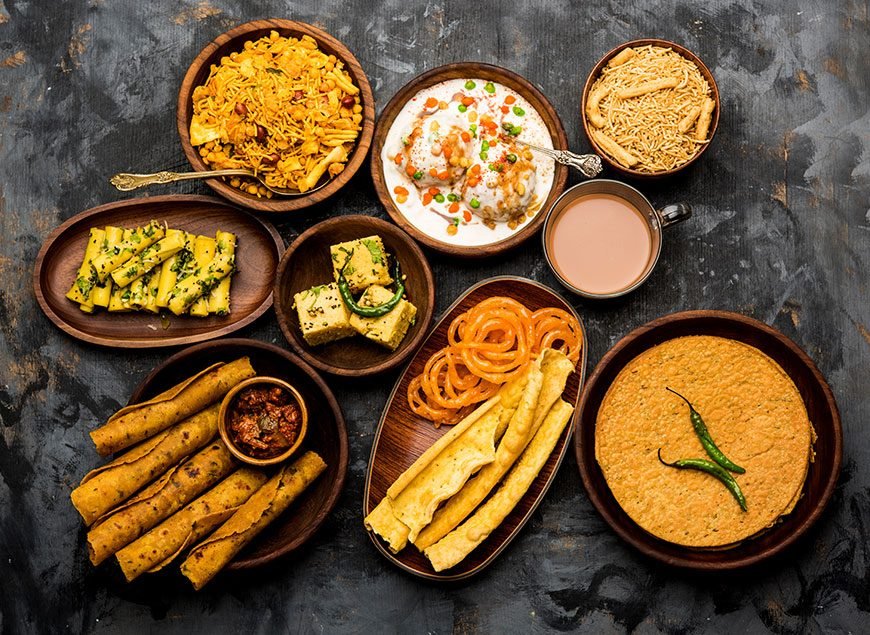
Gujarati Cuisine: A Vegetarian’s Delight
Gujarati Cuisine and Jainism
Gujarat, with a significant Jain population, boasts a vegetarian cuisine that is rich in flavor and variety. The influence of Jainism is evident in the plethora of dishes that exclude certain vegetables and all kinds of meat.
The Flavors of Gujarati Cuisine
Gujarati cuisine is known for its distinct flavors, characterized by a delicate balance of sweet, sour, and spicy. From hearty lentil soups (daal) and flatbreads (roti) to tangy pickles and sweet desserts, the cuisine offers a gastronomic delight for vegetarians.
Gujarati Snacks: A Culinary Delight
Gujarati snacks, known as ‘Farsan’, are a highlight of the cuisine. These include popular dishes like Dhokla, Khandvi, and Thepla, which are not only delicious but also adhere to the Jain dietary rules.
Gujarati Cuisine: A Global Influence
Gujarati cuisine has not only influenced Indian cuisine but has also made its mark globally. With an increasing number of people choosing vegetarian and vegan diets, Gujarati dishes have found popularity worldwide.
Tags: Gujarati Cuisine, Jainism, Vegetarianism, Indian Cuisine, Global Influence, Farsan, Veganism

Rajasthani Cuisine: Desert Delicacies
Rajasthani Cuisine and Jainism
Rajasthan’s cuisine, known for its unique flavors and hearty dishes, has been influenced by Jainism. The cuisine includes a variety of vegetarian dishes, aligning with the Jain ethos of non-violence and respect for all forms of life.
The Flavors of Rajasthani Cuisine
Rajasthani cuisine is characterized by its robust flavors and diverse ingredients. Despite the arid climate and scarcity of fresh vegetables, the cuisine is rich in flavors, making extensive use of lentils, grains, and dairy products.
Rajasthani Dishes: A Culinary Journey
Rajasthani dishes like Dal Baati Churma, Gatte ki Sabzi, and Ker Sangri are not only delicious but also adhere to Jain dietary rules, making them a favorite among the Jain community.
Rajasthani Cuisine: A Global Influence
Like Gujarati cuisine, Rajasthani cuisine has also gained popularity worldwide. Its unique flavors and vegetarian-friendly dishes have made it a favorite among those seeking to explore Indian vegetarian cuisine.
Tags: Rajasthani Cuisine, Jainism, Vegetarianism, Indian Cuisine, Global Influence, Dal Baati Churma, Gatte ki Sabzi
Conclusion
Jainism‘s influence on Indian cuisine is profound. The religion’s dietary principles have not only shaped a unique culinary tradition but also influenced the eating habits of various communities. As we explore Jain cuisine, we discover a blend of taste, health, and spirituality, reflecting the religion’s core principles.

